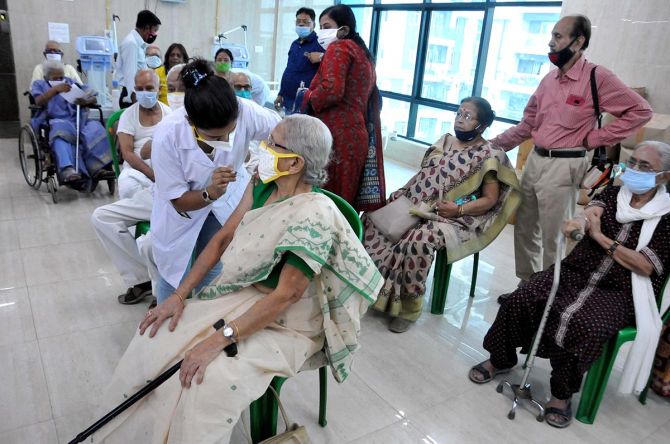People aged 45 and above account for about 88 per cent of all COVID-19 deaths in India making them the most vulnerable section, the Union health ministry said on Wednesday, a day after the government opened up vaccinations for all those in the age bracket from April 1.

Addressing a press conference, Union Health Secretary Rajesh Bhushan said the case fatality rate in the age group is 2.85 per cent as against an overall national average of 1.37 per cent.
"About 88 per cent of all COVID-19 deaths in the country are taking place in the age group of 45 years and above, making them the most vulnerable group that needs to be protected," he said, adding that this is the reason behind allowing their vaccination from April 1.
NITI Aayog Member (Health) V K Paul said there is adequate supplies of vaccines for inoculating those aged 45 and above.
"We have seamless connection with states. There is no inadequacy of vaccine supply," he said.
Speaking about the new SARS-CoV-2 variants, National Centre for Disease Control Director S K Singh said that 771 cases of variants of concern (VOCs) have been detected in a total of 10,787 positive samples in 18 states and union territories, which include 736 samples positive for viruses of the UK (B.1.1.7) lineage.
Also, 34 samples were found positive for viruses of the South African (B.1.351) lineage and one sample for the Brazilian (P.1) lineage.
In addition to these, some other variants, including the double mutant variant, have been found in some states such as Maharashtra and Delhi and need to be further analysed and investigated for establishing any epidemiological correlations.
There are only three variants of concern, detected in the UK, South Africa and Brazil, he clarified.
Till now, no linkage has been established to show that the surge being witnessed in some states is directly because of only virus mutants.
There are various reasons behind a surge.
States having a larger pool of susceptible population are prone to witness rise in cases. Whenever the susceptible population will lower their guard and not follow COVID-19-appropriate behaviour, they will get the infection, be it the normal virus or the mutants, he said.
Bhushan said there are roughly three per cent active cases of COVID-19 and these are concentrated mainly in 10 districts -- nine in Maharashtra and one in Karnataka. These districts are Pune, Nagpur, Mumbai, Thane, Nashik, Aurangabad, Nanded, Jalgaon, Akola, and Bengaluru Urban.
"Two states (Maharashtra and Punjab) are of grave concern which showed recent surge in cases," he said.
"We had a meeting with health officials of Maharashtra and Punjab to talk about refinement in their strategy to tackle the surge," he said.
Bhushan said there are a few other states too which are a matter of serious concern. These are Gujarat, Madhya Pradesh, Karnatak, Tamil Nadu, Chhattisgarh and Chandigarh which have recorded a surge in COVID-19 cases.
On vaccination, Bhushan said 5,08,41,286 coronavirus vaccine doses were administered till 10 am Wednesday, which include 2,64,52,366 doses given to those aged above 60 and those aged 45-60 years with comorbidities.
Bhushan said Telangana, Chandigarh, Nagaland and Punjab have low vaccination coverage of healthcare workers.
Bhushan said Telangana, Manipur, Nagaland, Mizoram and Chandigarh have low vaccination coverage of frontline workers.
The government had announced on Tuesday that from April 1, all people above 45 years of age will be eligible to get COVID-19 vaccines.
He further said the revised time gap between two doses is applicable only to Covishield, and not to Covaxin.
Paul said vaccination is being ramped up with participation of public and private sectors.
"Active participation of the private sector has been very important for us but still there is a great room for improvement," Paul said as he appealed to the private sector partners to come forward to participate in the inoculation drive.
Presently, 34,481 government and 5,425 private facilities are providing vaccination across the country, he said.
Responding to a question on blood clotting post vaccination, Paul said the committee which closely monitor adverse events following immunisation has 'concluded that thrombosis events due to Covishield in India is not a problem'.
In response to a question on the effectiveness of the vaccines against three variants, ICMR Director General Balram Bhargava said, "It is well established by research studies in published literature that the vaccines available in our country -- both Covishield and Covaxin -- are effective against UK and Brazilian variants.
"The research work regarding the South African variant is ongoing."
On the double mutant variant, Singh said it being observed in 206 samples in Maharashtra and in a varied number in Delhi also.
Bhargava said, "As we are seeing the early second wave and completing more than one year of our fight against the virus, the focus should be on testing, wearing masks and vaccination."











 © 2025
© 2025